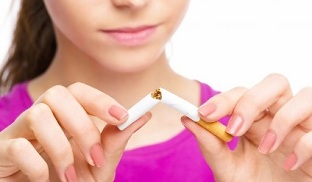
When giving up bad habits, the main thing is to set a goal and not exceed it by achieving the goal. Very few people can quit smoking here once and for all. This is a long time with its own blows and experiences. All this is due to emotional, psychological and physiological features. You can quit smoking alone, but you must do it properly, reasonably, and gradually.
Let's try to understand all the twists and turns in this important but not easy task. Experts have developed a formula for success for a person who has given up addiction and a graphic with a detailed description of the changes taking place in the body. I wonder what happens to the body when you quit smoking? Let's try to understand this.
Important: the effect of the day on the body
During the transition to a healthy lifestyle, significant clinical changes occur in the body of an adult (heavy smoker), the emotional background and physiological state changes. Each new day of quitting differs from the previous day against the background of psychological problems and physical well-being. As they say, the main thing at the moment is not to break. Thus, we will present a picture of what happened in the form of a diary, in which a number of calendar days are marked and a description of the existing symptoms is given.
Quit smoking: First day
Finally, when the decision to quit smoking is finally and irreversibly made (albeit not for the first time), it is necessary to gradually "get into" this process. It is important to know how the body will behave in order to facilitate the transition from an unhealthy lifestyle to a healthy lifestyle. On the first day of the "course" of a healthy lifestyle, the weakened body needs to get used to a new regime and begin the recovery process. A sudden transition from one situation to another can negatively affect overall well-being and reduce resilience. This is not only a physical, but also a psychological test.
The main thing that happens in the body when you quit smoking: the amount of carbon monoxide decreases, the transport of erythrocytes improves and more oxygen enters the tissues. Apparently, the "former" smoker enjoys a new pleasure for himself on the first day after quitting nicotine, more active, cheerful, confident in his strength. Leaving the habit of smoking painlessly on the first day of the course convinces the heavy smoker of determination and willpower. This is important to eliminate nicotine cravings.
But remember that on the first day, the body begins to undergo characteristic physiological changes.
For example, what happens to a woman's body:
- slight dizziness,
- anorexia,
- weakness,
- anxiety,
- sleep disorders,
- insomnia.

What is the reason? An experienced smoker tests the human body on an emotional-psychological and physiological level. Such deep processes are triggered that the body cannot "live" without nicotine.
Quitting smoking causes other dramatic changes. Nicotine not only enters the bloodstream, it begins to affect the bloodstream. For this reason, it is important to think that it will generally take at least a year for the body to stop smoking. But for now, quit smoking.
Remember that on the first day of smoking cessation, the body begins to experience characteristic physiological changes, for example, women experience mild dizziness.
Quit smoking: Second day
At this point, determination can bring you down a bit - attacks will start to return to the old habit (at least for a long time). For example, what happens in a man's body. When the struggle goes on an emotional level, less dramatic changes occur in the body: the respiratory organs are freed from mucus and sediment components, ciliated epithelial functions are restored, the condition of the gastrointestinal tract improves, new cells are formed in the tissues. Changes in the emotional level during this period manifest themselves in the form of euphoria, emotional arousal. But nervousness can also be seen. It all depends on hypnosis and self-discipline. However, sometimes drowsiness can be suddenly replaced by energy. On the second day after quitting, the appetite is not fully restored (strange taste sensations may occur). You may also have shortness of breath, cough, and even stomach pain. During this period, urinary urges and difficulty falling asleep become more frequent. If you add to this, for example, nervous tension as a result of stress at work, itching of the skin is quite natural.
Smoking cessation: third and fourth days
Let's take a look at what happens to the body when you quit smoking. A number of factors affect how well the body improves. In particular, the general condition and weakened immunity play a special role. Therefore, the nuances of smoking cessation therapy should be evaluated at the cellular level. Everyone has their own inner energy to fight addiction. Therefore, an individual approach is needed. During the cleansing process, the body is freed from toxins. The structure of the cells changes to trigger such a radical cleansing.
Here's what happened to the body these days:
- Restoration of ciliated epithelium in respiratory tissues,
- alkaline fractions in the pancreas increase,
- less mucus accumulates in the stomach,
- In general, blood circulation in the heart and brain improves.
An obvious desire to smoke begins to appear, peristalsis normalizes. At the same time, the "smoking" of a former smoker intensifies, which has a more psychological effect, causing nervousness. Quitting smoking by struggling with a long-term habit such as "can't find a place for yourself. "Against this background there is a growing appetite that "captures" sweets. Sometimes the skin begins to peel and the fingers swell. Sputum may appear in the throat when coughing.
Quit smoking: Fifth Day and Six
In the process of "quitting" smoking, many people use a special table or calendar for convenience, someone keeps a diary, records their feelings in detail. This is useful when you need to identify related symptoms and changes in your body. As it gets easier after a few days, it will help you save and analyze your daily mistakes. A smoker who has passed from the fifth to the seventh day notices the following changes in his body: he notices how quickly the microtraumas in the skin begin to heal; all segments of the respiratory system are restored (and even the most distant ones); digestion normalizes; Invisibly, blood cells are cleared of nicotine.

Generally, the end point in the fight against addiction is set on the seventh day when a person's physical dependence on cigarettes (smoke, smell) disappears. At the same time there is no feeling of psychological anxiety. But do not forget about the possibility of recurrence. Violations happen anyway. When euphoria passes, nervousness and aggression arise. Again, the sleep problem may recur. But it is important to remember that this is not a long time, that the main stage in life - quitting smoking - has been successfully completed, and there is no motivation to return to the old life.
In the process of "quitting" smoking, many people use a special table or calendar for convenience, someone keeps a diary, records their feelings in detail.
Quit smoking: Second week
A week later, Rubicon is over and you can now live like a non-smoker quietly dealing with daily worries. But this rarely happens. The body definitely made a big leap in the first week of quitting smoking. However, sometimes external factors (cigarette smoke and even the appearance, for example, when smoking nearby) can play a bad joke with a former smoker. That's why it's worth sharing your plans with friends and acquaintances so you don't have the temptation to leave "for company. "
It's worth listening to your body right now, it's probably able to get itself out of nicotine. However, this is not the end of the body's recovery from nicotine addiction. By looking at the calendar of a former smoker, you can help yourself by seeing obvious changes in your work. From the second week, it turned out that the struggle turned into a completely psychological level. The urge to smoke can be caused by stress, sadness, or the appearance of an active smoker at work. One must learn not to react to external promises, such as going back to the past.
What happens at the end of the second week?
It's been 14 days since a former smoker quit nicotine addiction. So far, the following changes have been noted in the body: improvement of bronchitis and platelet renewal. Although red blood cell renewal has not yet taken place. This may be due to vegetative-vascular manifestations. At the same time, you can see how the skin improves, the fingers lose their yellow color, and the acute cough gradually disappears. The longer a smoker's experience, the longer the symptoms appear.
What happens in the first month of quitting?
On the 30th day of smoking cessation, weight loss begins, the upper respiratory tract is completely restored and psychological comfort is felt. It can also be replaced with enthusiasm, depression or blue. As in the first week, it is important not to be idle, to stand firm, because the most difficult way to quit smoking has already passed.
What happens in the second month of smoking?
Starting in the second month of the nicotine addiction recovery process, over the next three to four months, the ex-smoker (which is especially noticeable in women) gains more pleasant facial features, reduces swelling, and the gray color of the face disappears, as well as couperose nets. In the third month, there is an intensive regeneration of blood vessels in the body. This indicates that the body tone has finally returned to normal and the "turning point" has finally passed. The physical craving for tobacco is so weakened that a person can easily accept another smoker without suffering. In general, there is significant progress on an emotional, psychological and physical level. Good appetite is no longer a sign of stress, it is simply associated with well-being.
What happens in the first year after quitting?
Now let's look at what happens to the body when you quit smoking for a long time. Six months is an important stage. At this stage of life, doctors note a complete renewal of all body systems when the blood and cells are almost completely free of the toxin (nicotine). It seems easier to breathe every new day. The lungs actually work more efficiently. It is a real experience of a smoker more than a year ago. It is a period when the first serious results can be summarized. For example, you can congratulate yourself on the successful completion of the event and simply enjoy a life without nicotine, which will definitely bear fruit. Smokers reduce the risk of heart attack and stroke by 30-50 percent; lung cancer - 80 percent; Problems of the gastrointestinal tract - 70 percent.
Willpower or alternatives
Many people who quit smoking misunderstand how easy it is to achieve one goal by giving up another habit. However, any psychoactive substance causes cravings for other addictions. Someone switches to a light cigarette, someone continues to smoke a pack of cigarettes in a timely manner. Of course, smokers with twenty years of experience find it more difficult than others. In this case, smoking cessation is not sharp, but cyclical. In any case, only a person can liberate himself by giving up a habit.

























